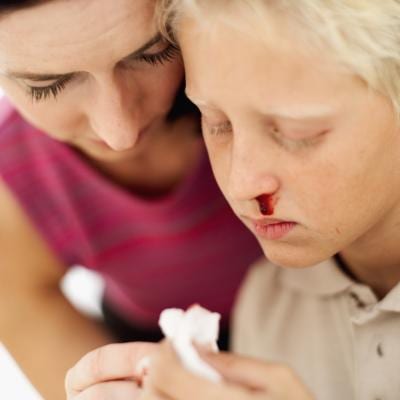Seeing your child’s face streaked with red from a nosebleed can be a terrifying experience — and it gets scarier when it occurs frequently. Knowing how to deal with the immediate nosebleed and prevent the problems causing it can help make nosebleeds a little less frightening for you and your child.
Identification
Your child’s nose has a high concentration of blood vessels to pick up oxygen when your child inhales. But because these blood vessels are close to the surface of the skin, it doesn’t take much to make them bleed. Kids are more likely to get frequent nosebleeds than adults, but children’s nosebleeds are also less likely to be serious.
Causes
Several different factors can contribute to frequent nosebleeds in children. Nose picking, especially in conjunction with allergies, sinus infection or colds, can be a common cause. Bacterial infections and irritation caused by dry air can also increase your child’s likelihood of getting nosebleeds. Getting hit in the nose can also cause bleeding, even when the injury isn’t serious, but nose trauma is more likely to cause one-time nosebleeds than frequent bleeding.
Treatment
Nosebleeds can produce a lot of blood even when they aren’t serious, so don’t panic if your child seems to be bleeding a lot. Try to calm your child, who may be scared or panicked, and keep him in a sitting position so that his head is higher than his heart. Help him lean forward slightly so that blood doesn’t run back down his throat. Use your thumb and index finger to gently squeeze the middle part of your child’s nose for at least 5 minutes to stop the bleeding. Repeat as needed until the bleeding stops.
Prevention
The key to preventing recurring nosebleeds is to keep your child’s nose well moisturized, says Dr. William Sears of Ask Dr. Sears, a medical website. Use saline mist and lanolin ointment just inside the nostrils to keep your child’s nasal cavities hydrated, and dab antibiotic ointment on any red, irritated areas just inside the nostrils. Consider running a vaporizer in your child’s room at night to keep her from breathing dry air.
Warning
Nosebleeds are not usually a serious problem, but if you can’t stop your child’s nosebleed after 20 minutes, you should seek medical attention. If your child has ongoing issues with nosebleeds but you can’t discern a reason, such as allergies or nose picking, see your child’s pediatrician. In some cases, ongoing nosebleeds may be an underlying sign of a more serious condition, such as leukemia, nasal tumors or blood clotting problems. Always seek medical attention if your child’s nosebleed is accompanied by a severe headache or other unexplained bleeding or bruising.





